This is a list of universities in Central African Republic. [1]
This is a list of universities in Central African Republic. [1]

The Central African Republic (CAR), formerly known as Ubangi-Shari, is a landlocked country in Central Africa. It is bordered by Chad to the north, Sudan to the northeast, South Sudan to the east, the Democratic Republic of the Congo to the south, the Republic of the Congo to the southwest, and Cameroon to the west. Bangui is the country's capital and largest city, at the border with the Democratic Republic of the Congo. The Central African Republic covers a land area of about 620,000 square kilometres (240,000 sq mi). As of 2024, it has a population of 5,357,744, and is in the scene of a civil war, which has been ongoing since 2012.

Bangui is the capital and largest city of the Central African Republic. It was established as a French outpost in 1889 and named after its location on the northern bank of the Ubangi River ; the Ubangi itself was named from the Bobangi word for the "rapids" located beside the settlement, which marked the end of navigable water north from Brazzaville. The majority of the population of the Central African Republic lives in the western parts of the country, in Bangui and the surrounding area.

François Bozizé Yangouvonda is a Central African politician who was President of the Central African Republic from 2003 to 2013. He was the only Central African president born in modern-day Gabon.
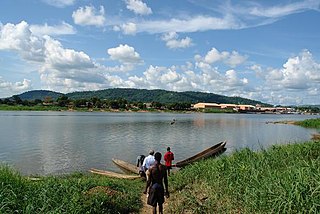
The Ubangi River, also spelled Oubangui, is a river in Central Africa, and the largest right-bank tributary of the Congo River. It begins at the confluence of the Mbomou and Uele Rivers and flows west, forming the border between Central African Republic (CAR) and the Democratic Republic of the Congo (DRC). Subsequently, the Ubangi bends to the southwest and passes through Bangui, the capital of the CAR, after which it flows south – forming the border between the DRC and the Republic of the Congo. The Ubangi finally joins the Congo River at Liranga.

The University of Bangui is a public university located in Bangui, Central African Republic.

The Central African Republic Bush War was a civil war in the Central African Republic which lasted from 2004 to 2007 between Union of Democratic Forces for Unity (UFDR) rebels and government forces. The rebellion began after François Bozizé seized the nation's presidency in 2003. Actual fighting began in 2004. Around 10,000 people were displaced because of the civil unrest.

Faustin-Archange Touadéra is a Central African politician and academic who has been President of the Central African Republic since March 2016. He previously was Prime Minister of the Central African Republic from January 2008 to January 2013. In the December 2015 – February 2016 presidential election, he was elected to the presidency in a second round of voting against former prime minister Anicet Georges Dologuélé. He was re-elected for a second term on 27 December 2020.
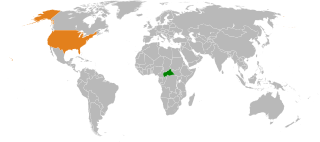
Central African Republic–United States relations are the international relations between Central African Republic and the United States of America. The relations have generally been positive, although concerns over the pace of political and economic liberalization and human rights have affected the degree of support provided by the United States to the Central African Republic.
Up to 2012 Chad had no rail system. Two lines are planned to Sudan and Cameroon from the capital, with construction expected to start in February 2016 and be complete in 4 years.

Health in the Central African Republic has been degraded by years of internal conflict and economic turmoil since independence from France in 1960. One sixth of the country's population is in need of acute medical care. Endemic diseases put a high demand on the health infrastructure, which requires outside assistance to sustain itself.

Central African cuisine includes the cuisines, cooking traditions, practices, ingredients and foods of the Central African Republic (CAR). Indigenous agriculture in the country includes millet, sorghum, banana, yam, okra, yellow onion, garlic, spinach, rice and palm oil. Imported crops of American origin include maize, manioc (cassava), peanuts, chili peppers, sweet potato and tomato. Additional foods include onions, garlic, chiles and peanuts.

The Central African Republic Civil War is an ongoing civil war in the Central African Republic (CAR) involving the government, rebels from the Séléka coalition, and Anti-balaka militias.
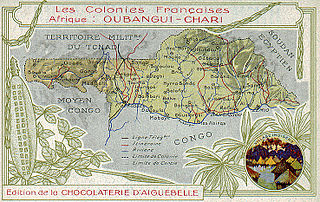
Bangui Agreements is a 1997 negotiated peace accord in the Central African Republic (CAR). It was drawn up in Bangui to bring an end to the 1990s conflict between government and rebel forces. It was signed by the Patassé government, opposition parties and religious groups. The agreement envisaged several steps to sort out the views of various political factions, reorganize the defense establishment, and implement reforms in the country to improve its economy.

European Union Force RCA, commonly referred as EUFOR RCA, is the United Nations-mandated European Union peacekeeping mission in Bangui, capital of the Central African Republic. The goal of the mission is to stabilize the area after more than a year of internal conflict. Agreement about the mission was reached in January 2014, and the first operations started at the end of April. The mission ended its mandate after nearly a year on 15 March 2015.
A coup d'état occurred in March 2003 in the Central African Republic when the forces of General François Bozizé marched on Bangui, the country's capital, while President Ange-Félix Patassé was attending a regional Community of Sahel–Saharan States leaders' summit in Niger.
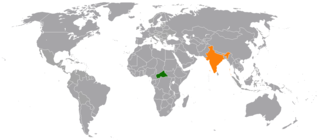
Central African Republic–India relations refers to the bilateral relations between the Central African Republic (CAR) and India. The Embassy of India in Kinshasa, Democratic Republic of the Congo is concurrently accredited to CAR. India also maintains an Honorary Consulate General in Bangui. CAR has no diplomatic mission in India.
The following is a timeline of the history of the city of Bangui, Central African Republic.
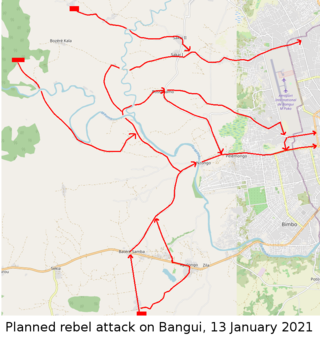
On 13 January 2021 around 200 rebels from Coalition of Patriots for Change attacked Bangui, the capital of the Central African Republic, in an attempt to overthrow the government which resulted in failure.